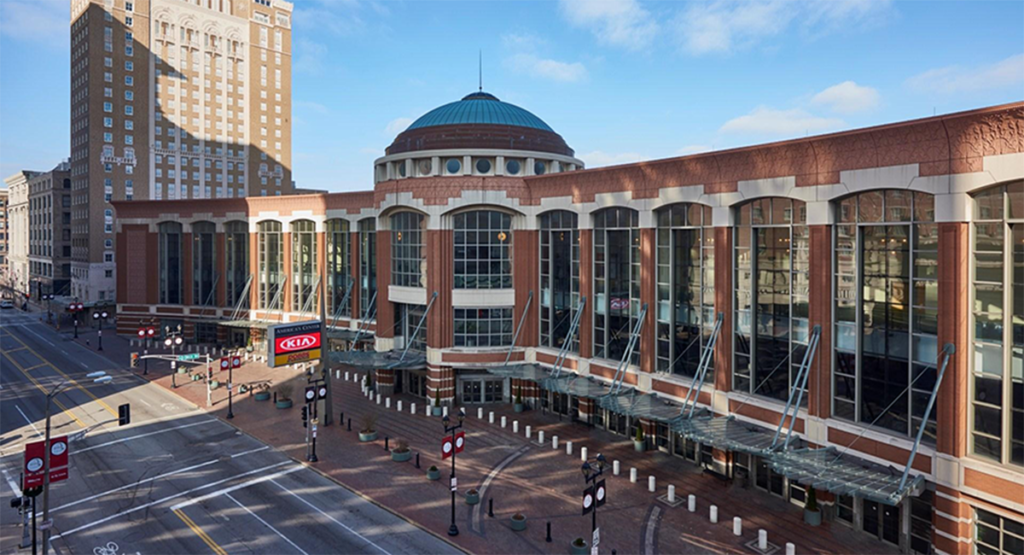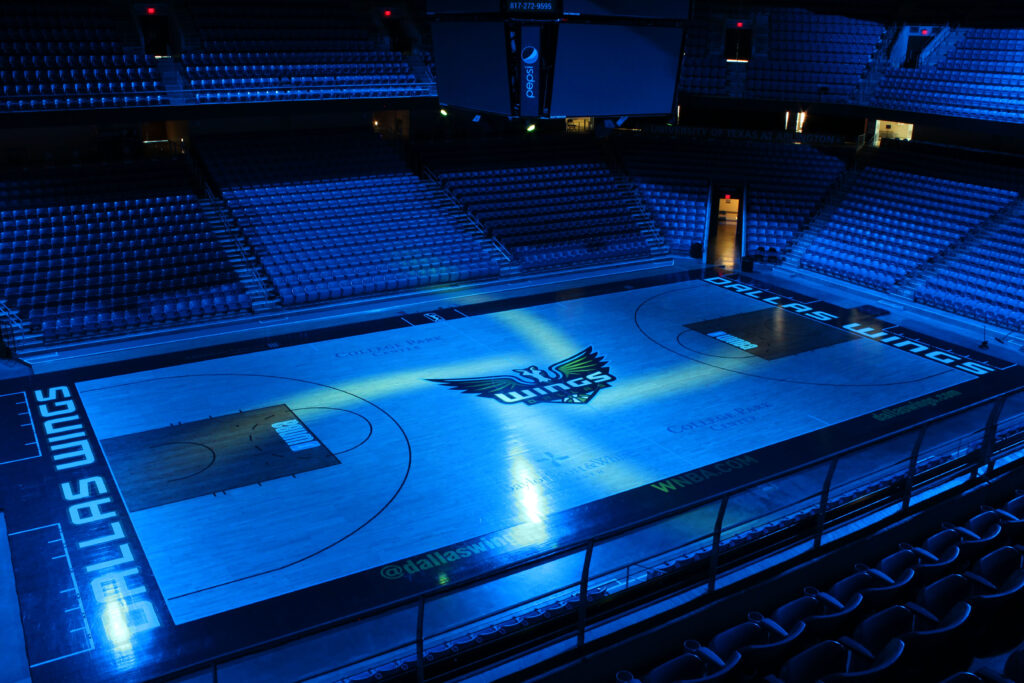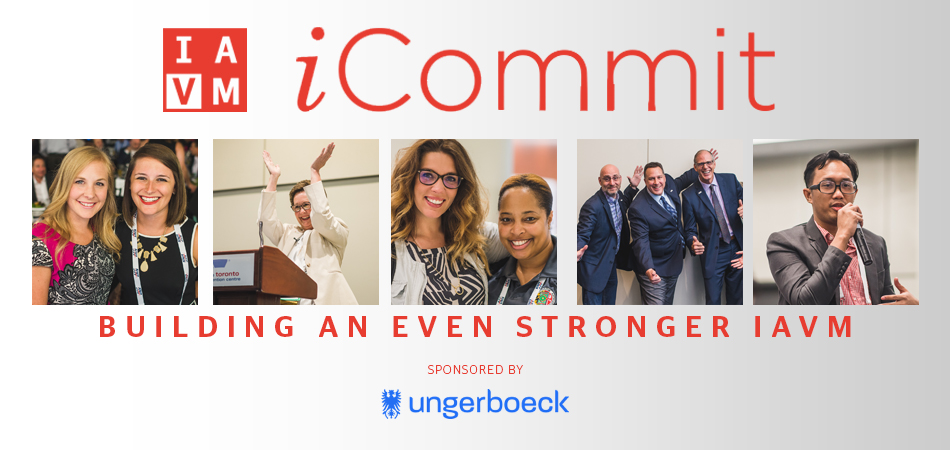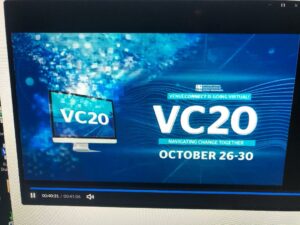Explore St. Louis Selects VenueOps & Simpleview as Forward-Thinking Partners
By Kalyn Sisco
EventBooking, a cloud-based venue software company, announced that Explore St. Louis has selected VenueOps to manage their facilities, and Simpleview, a partner of EventBooking, to help manage client relationships and marketing of the premiere CVB.
Explore St. Louis, operators of the iconic America’s Center Convention Complex, is looking forward to more a  seamless and modernized way of doing business, thanks to their recent decision to use VenueOps, the latest venue management software from EventBooking, and Simpleview, a lead provider of CRM/CMS systems and digital marketing solutions.
seamless and modernized way of doing business, thanks to their recent decision to use VenueOps, the latest venue management software from EventBooking, and Simpleview, a lead provider of CRM/CMS systems and digital marketing solutions.
Located in the heart of downtown, Explore St. Louis serves as a vital cultural asset of the city. They are planning for the future by transitioning from technology that has been in place for the past couple of decades, and relying on what many regard as the two most intuitive platforms in the market to manage their sales and venue management processes.
Darren Ison, Director of Information Technology for Explore St. Louis, commented, “With our legacy system, we were limited with flexibility and functionality, with a lot of double-handling and use of manual processes to do what we needed to do. After extensive research, we found the best way forward for us was to partner with these two outstanding companies. They understand our needs and are also tightly integrated, so this way we get the best of both worlds — the absolute best in class for each of their respective areas, plus they talk to each other.”
Steve Mackenzie, President of EventBooking, said, “We are truly delighted that the America’s Center has selected VenueOps to fulfill their venue management needs, and that our partnership and integration with Simpleview’s CRM will allow them to do things they could only dream of before. It’s a privilege to be recognized in this way; I consider it a testament to how we’re becoming the leading choice for convention centers, and how our level of service is increasingly setting us apart. We embrace the concept that tight partnerships with other technology leaders like Simpleview is what the industry needs, and we’re committed to this path of easy-to-use software with extremely flexible integration options.”
Kalyn Sisco is Marketing Manager at EventBooking.
UT Arlington’s College Park Center to Energize Atmosphere With LED, Special-Effects Lighting
By Jonathan Carroll
Athletes, performers, and spectators alike will soon find a transformed arena experience at The University of Texas at Arlington’s (UTA) College Park Center, after the installation of a new LED lighting system with cutting-edge special effects capabilities.
The 7,000-seat College Park Center is the home venue for the WNBA’s Dallas Wings, as well as UTA’s  intercollegiate basketball and volleyball programs. Additionally, the arena hosts a wide range of concerts, conferences, and other major events throughout the year. When University leaders decided to replace the venue’s original lights, they needed a state-of-the-art LED system that would elevate light levels to meet WNBA broadcast standards, while also enhancing the overall entertainment experience.
intercollegiate basketball and volleyball programs. Additionally, the arena hosts a wide range of concerts, conferences, and other major events throughout the year. When University leaders decided to replace the venue’s original lights, they needed a state-of-the-art LED system that would elevate light levels to meet WNBA broadcast standards, while also enhancing the overall entertainment experience.
“As we began looking at opportunities to invest back into College Park Center, enhanced sports lighting topped the list,” CPC Executive Director Jeff Davis said. “We were looking for a lighting system that would target four main goals: 1) provide a more uniform distribution of light for a better broadcast experience, 2) reduce light spill in the arena to create a more theatrical experience centered on the playing court, 3) provide enhancements to the overall environment and fan experience, and 4) further our efforts in energy conservation and environmental stewardship. Musco’s solution checked every box while providing a system that can easily be serviced and maintained for years to come.”
The new lighting system is custom-designed by Musco, whose Total Light Control—TLC for LED® technology is featured at some of the biggest stadiums and arenas around the world. The system includes Musco’s Show-Light+™ entertainment package with color-changing red-green-blue (RGB) fixtures, which will create exciting new light shows.
“UTA wanted to create the best possible arena experience for athletes, performers, and fans,” Musco Vice President Jeff Rogers said. “Show-Light+ and the RGB fixtures are going to create custom, color-changing light shows that will result in a really amazing atmosphere.”
The efficiency of the advanced LED light source technology will reduce energy consumption at College Park Center by 79 percent compared to the previous lighting, while also improving light levels and uniformity on the court. The system is backed by a long-term warranty covering every part and all labor, eliminating UTA’s maintenance costs at the arena through the year 2030.
“From the moment a fan, visitor, or athlete enters the arena, our focus is on their experience. The enhancements completed this summer create the same look and feel you have at other top level professional sports arenas, and we are excited to bring that same experience to central Arlington for our home teams and fans. It’s definitely a gamechanger for the CPC,” Davis said.
Jonathan Carroll is Assistant Director, Event and Venue Marketing, Special Event Facilities, for College Park Center – Texas Hall -UTATickets at the University of Texas at Arlington.
iCommit 2020 Results

iCommit, IAVM’s annual member referral campaign, ran this year from March 1-June 30, 2020. The objective of the campaign is for every current member to recruit one or more individuals to join our community of venue professionals.
We are happy to announce that 61 members were entered in the raffle to win prizes for each new member they referred. With their support, we added 156 new members!
- Grand Prize Winner – VenueConnect2021 free registration goes to Ross Richards, Kimmel Center for the Performing Arts
- Raffle Winners – Five, $500 Apple Gift Cards
- Russ Simons – SoFi Stadium – Inglewood, CA
- Gerard Siegler – Straz Center for the Performing Arts – Tampa, FL
- Scott Ellison – TCF Bank Stadium – Minneapolis, MN
- Erik Waldman, CVE – tvsdesign – Atlanta, GA
- Russ Simons – SoFi Stadium – Inglewood, CA
- Region 1 added the most new members with a total of 36 members. The Region Director will select one recipient to have his/her CVP application fee waived (value $125) through July 2021.
We thank Ungerboeck Software International for their continuous support of this membership initiative and to all of our members who consistently respond to the call to help us continue to be the largest association serving the venue management industry in the world. If you have any questions, contact IAVM’s Director of Membership, Gina Brydson.
Rip Rippetoe, CVE, Takes Office as IAVM Chair in a “Virtual” Landslide
By R.V. Baugus
Tammy Koolbeck, CVE, shared some final remarks as her most interesting and unprecedented year as chair of IAVM drew to a close. Koolbeck offered her thanks and acknowledged the contributions of many who helped her get through a year in which the COVID-19 pandemic shuttered the public assembly venue industry. It was now time to hand the chair’s gavel to Rip Rippetoe, CVE, who effectively with the exchange moved from 1st Vice Chair to Chair. Tammy reached out her right hand and deftly handed the gavel to Rip, who took it with his left hand.
What made it such a deft handoff that went smoother than many quarterback-to-running back-handoffs was that the  two leaders were on separate screens as IAVM conducted the exchange of the gavel in a virtual webinar. Welcome, Chairman Rippetoe, and THANK YOU, Past Chair Koolbeck. You are both stalwarts of the industry and to be so admired and respected for your leadership in this time of pandemic crisis.
two leaders were on separate screens as IAVM conducted the exchange of the gavel in a virtual webinar. Welcome, Chairman Rippetoe, and THANK YOU, Past Chair Koolbeck. You are both stalwarts of the industry and to be so admired and respected for your leadership in this time of pandemic crisis.
In addition to the gavel exchange, a number of other special recognitions and awards were shared via technology of a screen to view the proceedings. No, it wasn’t Long Beach, and, no, we were not physically in each other’s presence, but the moment of the gavel exchange is always one of the most anticipated events at any VenueConnect, and the session on the afternoon of Wednesday, July 29, was no different.
Indeed, while kudos were being handed out, computer screens lit up on the chat icon as virtual attendees shared their comments and congratulated honorees. It all made you yearn even more to be with IAVM friends to share in the celebration together.
Special thanks goes to Ungerboeck for their sponsorship of VenueConnect20, which in addition to the time-sensitive passing of the gavel during the scheduled time of VenueConnect, will see the reconfigured annual conference take place in a virtual format from October 26-30, details of which will continue to be shared from IAVM.
For this day, though, it was a time to honor, celebrate, and recognize accomplishments, something so very needed when our industry like so many others continues to try and climb out of the hole created by the coronavirus.
Justin Ungerboeck began the proceedings following introductory announcements by IAVM President/CEO Brad Mayne, CVE, by introducing the newest class of the 30 Under 30. IAVM is proud to partner with Ungerboeck, and sincerely thanks them for their support of VenueConnect and the recognition of some of the industry’s up and coming stars.
Koolbeck then congratulated a special group of honorees in Charles A. McElravy Award recipient Rick Haycock, CVE; Joseph J. Anzivino Distinguished Allied Award recipient Bill Powell; and IAVM Foundation Legacy Award honoree Mina Boyd, CVE.
Koolbeck’s Chairman Citation recipients were next to be feted as Zakiya Smith-Dore, MBA, CVP; Jennifer Norris, CVE; Matt Hollander, CVE; and IAVM’s very own Greg Wolfe, were recognized.
As anyone who has served as IAVM Chair knows, the work still goes on back home while the Chair conducts business on behalf of the Association, and it was no different for Koolbeck, who gave thanks to her colleagues back at Iowa State University in Craig Wiebke, Emily Ladewig, and Craig Spillman.
She finished her comments by acknowledging Stefanie Tomlin and Eboni Wilson for their tireless work to help launch the Black Resource Group, an initiative to represent and provide a forum for underserved individuals within the IAVM membership.
Speaking of diversity and inclusive leadership …
Koolbeck’s final remarks about the new group segued nicely into the comments of new Chair Rippetoe, who emphasized that intentional development of initiatives for all underserved and underrepresented groups within the Association will continue to be an emphasis.
Among his other remarks, Rippetoe touched on a variety of topics, beginning with another couple of key words that are integral to his leadership.
“I believe that there are two words that apply more to us now more than ever,” he said. “Those are Purpose and Promise. Nine years ago, I heard the then CEO of Taco Bell, Greg Creed, give a speech to a small group of professionals, including me, about the power of our Purpose and our Promise. He told us that Purpose was why we existed. The Promise was how we delivered on why we existed.
“The Purpose of IAVM is to educate, advocate for, and inspire public assembly venue professionals, worldwide.
The Promise of IAVM is to provide unprecedented member value.”
Rippetoe went on to elaborate deeper on the important topic of diversity and inclusion.
“IAVM values diversity and inclusiveness,” he said. “IAVM provides opportunities to all people who wish to participate in the activities of the association without regard, including but not limited to: age, color, disability, family responsibility, gender, gender identity, national origin, political affiliation, race, religion, or sexual orientation.
“We have included this language in our policies, but now it is time to make sure our programs, policies and procedures are designed to welcome and include ALL our members. The Board is fully engaged with standing against racism and with being pro-reconciling. We will not just celebrate our diversity, but we will champion a sense of belonging within the organization for ALL.
“I am calling on our leaders to take an even more visible presence within the Association and to continue the efforts made over the past year in seeking ways for us to stand together against all forms of bias. They have done great work, but they cannot do it alone. To realize a future where all voices are welcome will take each of us taking intentional action to repeatedly invite perspectives of folks who have traditionally been underserved.”
In closing, Rippetoe shared his personal core values and what they mean. Those include:
Integrity – Keep your promises
Service – If I’m not serving our members, then serve someone who is
Collaboration – Work together for the common good
Courage – This is not the absence of fear, it is us stepping forward appropriately in spite of our fears.
Accountability – Anyone can ask me “why?” If I don’t have an immediate, good answer, I make a different decision.
“This is a time for strong, consistent leadership,” he said. “All of us need to commit to re-educating ourselves on the role of the IAVM to our members. All of your voices are important. I welcome your comments, critiques, ideas, and challenges.”
If you were not able to join us for all the great things that took place in the ceremonial passing of the gavel, don’t fret. To watch the proceedings, simply click here.
Bob Hunter Takes on Project Design Role to Build New esports Arena/Theater in Toronto
By R.V. Baugus
Bob Hunter, CVE, is known to just about everyone in the public assembly venue industry. By the same token, he knows just about everyone and has seen just about everything.
Until now.
Hunter, the industry veteran associated forever with Maple Leaf Sports & Entertainment in Toronto and now Senior Project Manager for Crossroads Consulting Services, calls the lack of events going on in venues something he has never witnessed.
“It’s just very disappointing,” Hunter said. “Just think about all those empty buildings. I’ve been a consultant for almost the last three years to the convention center and arena world, but it’s devastating.”
Hunter is now taking on a role in Toronto to build a new esports arena/theater that will seat in the 7,000- to  10,000-seat capacity level and serve as host to two teams while two other teams will be based in Europe. The project will be built adjacent to BMO Field and Hotel X Toronto and be home to the Toronto Defiant and Toronto Ultra.
10,000-seat capacity level and serve as host to two teams while two other teams will be based in Europe. The project will be built adjacent to BMO Field and Hotel X Toronto and be home to the Toronto Defiant and Toronto Ultra.
Hunter, no stranger to development and expansion projects in Toronto and throughout Canada, will work with government officials on the venue. If all goes well, Hunter expects to break ground by next summer.
“We’re pretty sure that the preliminary analysis shows we can justify making it work,” Hunter said. “We have about six months to go and hoping if we get the green light from the ownership group and it’s all private money that we can get in the ground in downtown Toronto. My task is to do a feasibility study basically to kind of nail down the design, run all the numbers, and try to get a construction cost.
In other words, things that Hunter has been doing throughout his decorated career.
“This is not meant for basketball or hockey but really for a focus on esports and the whole digital experience,” Hunter said.
That experience, as everyone knows, has exploded and even been played by professional athletes who otherwise have been shut down playing in their respective sports.
“I have done enough research to understand the size and reach of this business and it is unbelievable when you think of it being worldwide and watched by — I will call them 15- to 30-year-olds — who are active gamers,” Hunter said. “From a player standpoint, the numbers are off the chart. I know that three or four years ago when we first started talking about this, I thought about acquiring a team in one of the leagues but was skeptical. I was thinking, it’s hot right now, but does it have sustainability? Boy, oh boy, was I proven wrong. Proven wrong many times!
As Hunter mentioned, there will also be concert activity taking place in the venue. The fact that the expected capacity size fills a niche for concerts not readily present in the city only enhances the full scope of the project.
“Obviously, we’re talking to the Live Nations of the world,” Hunter said. “We literally have an amphitheater across the street but don’t have a true winter home. Scotiabank Bank arena is available but we are hoping we convince (concerts) with the saying, if we build it they will come. I’m excited. It’s going to be a fun project.”
As for his involvement after the build, Hunter is more inclined to pass.
“After working 120, 130 nights a year for a long time, the goal is to bring it on live with a young, 32-year-old building manager,” he said. “But I know that this is for real. When you have the Dallas Cowboys and a bunch of NFL teams and a bunch of NBA teams who are in, you know that there is staying power.”
Photo by Robert Paul via Blizzard Entertainment
Do you want to receive a Front Row News weekly digest?
Categories
- Allied (856)
- Architecture (147)
- Arenas (744)
- Career (890)
- Convention Centers (889)
- Education (608)
- Events (1,528)
- Food & Beverage (193)
- Foundation (113)
- Guest Experience (1,482)
- Industry News (2,253)
- Leadership (1,872)
- Marketing (150)
- Membership (1,985)
- Music (212)
- Performing Arts Centers (453)
- Professional Development (398)
- Research (127)
- Safety & Security (425)
- Sports (763)
- Stadiums (607)
- Student (159)
- Technology (515)
- Ticketing (92)
- Touring (82)
- Trends (357)
- Uncategorized (771)
- Universities (216)
- Video (25)
- Young Professional (198)
Twitter Feed
- Twitter feed loading
Recent Posts
- GEODIS Park Selects Allied Universal As Its Preferred Event Services Provider
- Venuworks Appoints Marc Solis as Executive Director of the Fresno Convention and Entertainment Center
- Los Angeles Convention Center Diverts 8,000 Pounds of Wood Waste to Local Foundation Supporting Fire Victims
- Fort Worth Unveils Plans for Phase 2 of Convention Center Transformation
- San Diego Convention Center CEO Announces Retirement After a Decade of Leadership
Categories
- Allied
- Architecture
- Arenas
- Career
- Convention Centers
- Education
- Events
- Food & Beverage
- Foundation
- Guest Experience
- Industry News
- Leadership
- Marketing
- Membership
- Music
- Performing Arts Centers
- Professional Development
- Research
- Safety & Security
- Sports
- Stadiums
- Student
- Technology
- Ticketing
- Touring
- Trends
- Uncategorized
- Universities
- Video
- Young Professional
Archives
- February 2026
- January 2026
- December 2025
- November 2025
- October 2025
- September 2025
- August 2025
- July 2025
- June 2025
- May 2025
- April 2025
- March 2025
- February 2025
- January 2025
- December 2024
- November 2024
- October 2024
- September 2024
- August 2024
- July 2024
- June 2024
- May 2024
- April 2024
- March 2024
- February 2024
- January 2024
- December 2023
- November 2023
- October 2023
- September 2023
- August 2023
- July 2023
- June 2023
- May 2023
- April 2023
- March 2023
- February 2023
- January 2023
- December 2022
- November 2022
- October 2022
- September 2022
- August 2022
- July 2022
- June 2022
- May 2022
- April 2022
- March 2022
- February 2022
- January 2022
- December 2021
- November 2021
- October 2021
- September 2021
- August 2021
- July 2021
- June 2021
- May 2021
- April 2021
- March 2021
- February 2021
- January 2021
- December 2020
- November 2020
- October 2020
- September 2020
- August 2020
- July 2020
- June 2020
- May 2020
- April 2020
- March 2020
- February 2020
- January 2020
- December 2019
- November 2019
- October 2019
- September 2019
- August 2019
- July 2019
- June 2019
- May 2019
- April 2019
- March 2019
- February 2019
- January 2019
- December 2018
- November 2018
- October 2018
- September 2018
- August 2018
- July 2018
- June 2018
- May 2018
- April 2018
- March 2018
- February 2018
- January 2018
- December 2017
- November 2017
- October 2017
- September 2017
- August 2017
- July 2017
- June 2017
- May 2017
- April 2017
- March 2017
- February 2017
- January 2017
- December 2016
- November 2016
- October 2016
- September 2016
- August 2016
- July 2016
- June 2016
- May 2016
- April 2016
- March 2016
- February 2016
- January 2016
- December 2015
- November 2015
- October 2015
- September 2015
- August 2015
- July 2015
- June 2015
- May 2015
- April 2015
- March 2015
- February 2015
- January 2015
- December 2014
- November 2014
- October 2014
- September 2014
- August 2014
- July 2014
- June 2014
- May 2014
- April 2014
- March 2014
- February 2014
- January 2014
- December 2013
- November 2013
- October 2013
- September 2013
- August 2013
- July 2013
- June 2013
- May 2013
- April 2013
- March 2013
- February 2013
- January 2013
- May 2012
- March 2012
- December 2011
- November 2011
- October 2011
Recent Comments
- Frank Bradshaw, Ph.D., CVE on John Meyer, CVE, a Tireless Advocate of Certification for Venue Professionals, Has Died
- Neil Sulkes on Hilary Hartung, Friend to Many in Venue Marketing, Has Left Us
- Jason Parker, CVE on The Devastation of Hurricane Helene and How We Can Support One Another
- Larry Perkins on Touhey Testifies Against Speculative Ticketing Before Congressional Subcommittee
- Peter Secord on Major Players for Planned Elkhart Amphitheater Were in the Mix at VenueConnect
